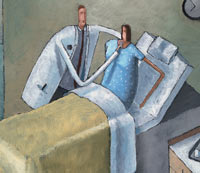What’s Next?
Palliative care specialists guide terminally ill patients through the tough questions.
James Cleary is a doctor, but he doesn’t have all the answers for patients facing a grim prognosis.
In fact, as a palliative care specialist, he’s the one asking questions. His goal is to find out how those patients want to spend what time they have left and to make sure those final months, weeks, or days are as pain-free as possible.
“I’m not taking away hope. I’m just being honest with their options,” he says.
The contentious health care reform debate thrust palliative care into the spotlight earlier this year, when critics falsely labeled a proposal to reimburse doctors for discussing advanced directives with patients as “death panels.” The truth is that palliative care is just good medicine, says Cleary, a past president of the American Academy of Hospice and Palliative Medicine. “We need good palliative care in order to actually bring about appropriate care for people with advanced disease,” he says.
UW Hospital opened a ten-bed unit devoted to such care two years ago and also hosts a fellowship to train doctors in the specialty, a program that could help combat an anticipated significant shortfall of specialists.
In the United States, hospice has been the primary option for palliative care. But about half of people who enter hospice facilities die within weeks, Cleary says, which is why doctors can and should address palliative care — including pain relief during certain treatments — much earlier in the hospital setting.
Palliative care specialists work closely with primary care physicians and aid with transitions during a patient’s treatment. While some colleagues claim that Cleary’s conversations always end up being about death and dying, he explains that his open-ended questions are meant to encourage patients to think about what’s next.
“The answers are within the patients,” he says.
Published in the Winter 2009 issue


Comments
No comments posted yet.